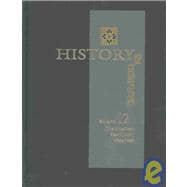| About the Series | xiii | ||||
| Acknowledgments | xiv | ||||
| Preface | xv | ||||
|
|||||
| Chronology | xix | ||||
|
|||||
|
1 | (8) | |||
|
2 | (2) | |||
|
|||||
|
4 | (5) | |||
|
|||||
|
9 | (8) | |||
|
10 | (3) | |||
|
|||||
|
13 | (4) | |||
|
|||||
|
17 | (10) | |||
|
18 | (4) | |||
|
|||||
|
22 | (5) | |||
|
|||||
|
27 | (9) | |||
|
28 | (3) | |||
|
|||||
|
31 | (5) | |||
|
|||||
|
36 | (7) | |||
|
37 | (3) | |||
|
|||||
|
40 | (3) | |||
|
|||||
|
43 | (7) | |||
|
44 | (3) | |||
|
|||||
|
47 | (3) | |||
|
|||||
|
50 | (10) | |||
|
51 | (4) | |||
|
|||||
|
55 | (5) | |||
|
|||||
|
60 | (8) | |||
|
61 | (3) | |||
|
|||||
|
64 | (4) | |||
|
|||||
|
68 | (9) | |||
|
69 | (5) | |||
|
|||||
|
74 | (3) | |||
|
|||||
|
77 | (8) | |||
|
78 | (2) | |||
|
|||||
|
80 | (5) | |||
|
|||||
|
85 | (7) | |||
|
86 | (3) | |||
|
|||||
|
89 | (3) | |||
|
|||||
|
|||||
|
92 | (8) | |||
|
93 | (3) | |||
|
|||||
|
96 | (4) | |||
|
|||||
|
100 | (8) | |||
|
101 | (3) | |||
|
|||||
|
|||||
|
104 | (4) | |||
|
|||||
|
108 | (10) | |||
|
109 | (4) | |||
|
|||||
|
113 | (5) | |||
|
|||||
|
118 | (9) | |||
|
119 | (3) | |||
|
|||||
|
122 | (5) | |||
|
|||||
|
127 | (9) | |||
|
128 | (3) | |||
|
|||||
|
|||||
|
131 | (5) | |||
|
|||||
|
136 | (9) | |||
|
137 | (3) | |||
|
|||||
|
140 | (5) | |||
|
|||||
|
145 | (10) | |||
|
146 | (3) | |||
|
|||||
|
149 | (6) | |||
|
|||||
|
155 | (9) | |||
|
156 | (2) | |||
|
|||||
|
158 | (6) | |||
|
|||||
|
164 | (9) | |||
|
165 | (3) | |||
|
|||||
|
168 | (5) | |||
|
|||||
|
173 | (8) | |||
|
174 | (3) | |||
|
|||||
|
177 | (4) | |||
|
|||||
|
181 | (7) | |||
|
182 | (3) | |||
|
|||||
|
185 | (3) | |||
|
|||||
|
188 | (8) | |||
|
189 | (3) | |||
|
|||||
|
192 | (4) | |||
|
|||||
|
196 | (8) | |||
|
197 | (3) | |||
|
|||||
|
200 | (4) | |||
|
|||||
|
204 | (9) | |||
|
205 | (3) | |||
|
|||||
|
208 | (5) | |||
|
|||||
|
213 | (8) | |||
|
214 | (3) | |||
|
|||||
|
217 | (4) | |||
|
|||||
|
221 | (9) | |||
|
222 | (3) | |||
|
|||||
|
225 | (5) | |||
|
|||||
|
230 | (9) | |||
|
231 | (3) | |||
|
|||||
|
234 | (5) | |||
|
|||||
|
239 | (9) | |||
|
240 | (5) | |||
|
|||||
|
245 | (3) | |||
|
|||||
|
248 | (9) | |||
|
249 | (2) | |||
|
|||||
|
251 | (6) | |||
|
|||||
|
257 | (10) | |||
|
258 | (3) | |||
|
|||||
|
261 | (6) | |||
|
|||||
|
267 | (9) | |||
|
268 | (3) | |||
|
|||||
|
271 | (5) | |||
|
|||||
|
276 | (9) | |||
|
277 | (4) | |||
|
|||||
|
281 | (4) | |||
|
|||||
|
285 | (8) | |||
|
286 | (2) | |||
|
|||||
|
288 | (5) | |||
|
|||||
|
293 | (8) | |||
|
294 | (3) | |||
|
|||||
|
297 | (4) | |||
|
|||||
|
301 | (9) | |||
|
302 | (4) | |||
|
|||||
|
306 | (4) | |||
|
|||||
|
310 | (7) | |||
|
311 | (3) | |||
|
|||||
|
314 | (3) | |||
|
|||||
|
317 | (8) | |||
|
318 | (3) | |||
|
|||||
|
321 | (4) | |||
|
|||||
| References | 325 | (10) | |||
| Contributors' Notes | 335 | (4) | |||
| Index | 339 |








